These obituary pages include alumni, supporters and former staff members who had strong connections to St George's, University of London (now City St George's, University of London). They have been created with the help of alumni and friends of the University.
If you would like to submit an obituary for inclusion on this page, please email us.
View all Close all
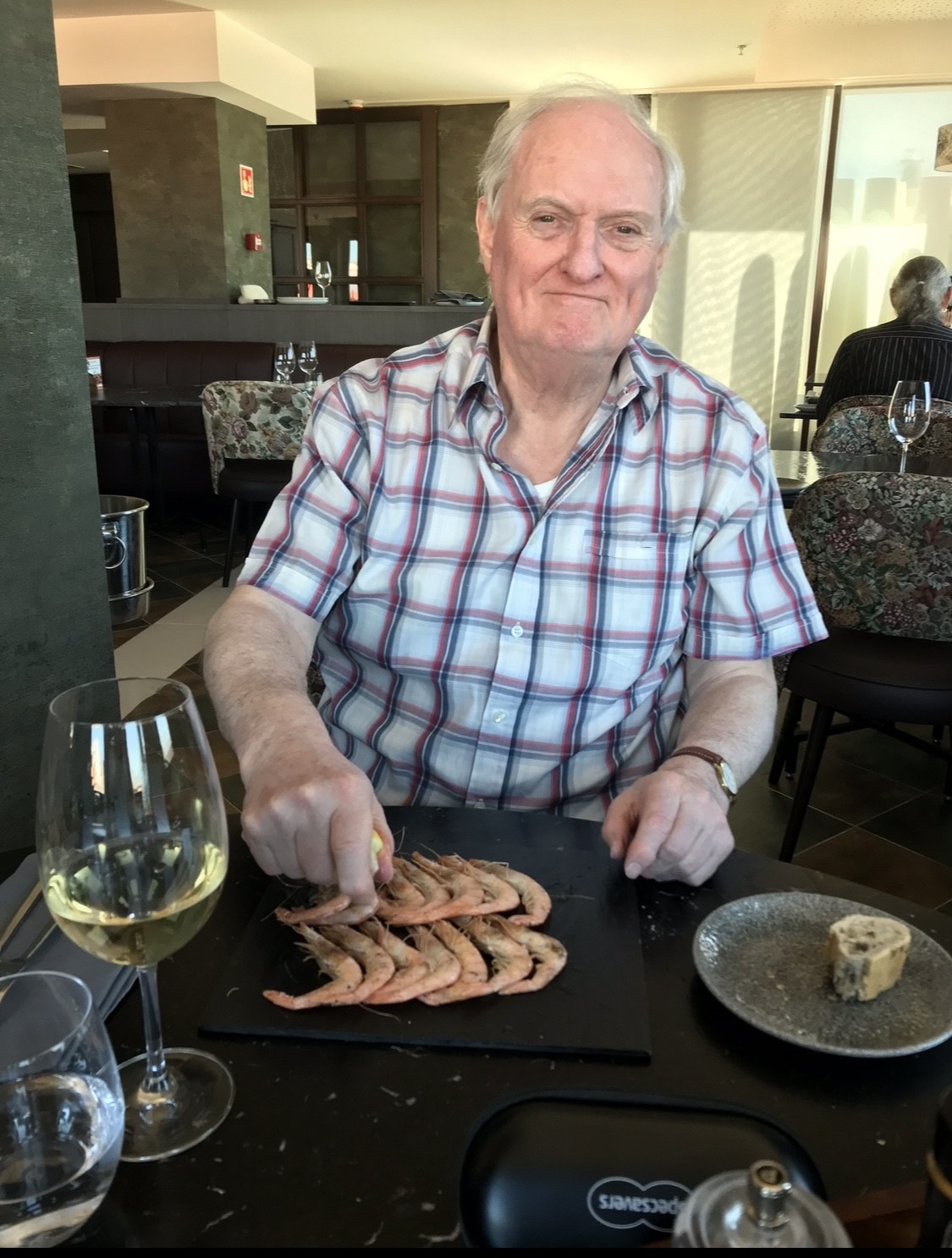
Medicine Class of 1962 alumnus, Dr John Timothy Baker, died peacefully on 29 March 2024 at the Royal Liverpool University Hospital aged 85. Having moved to London to begin his medical training in September 1957, Dr Baker, known as Tim by his friends, studied at St George’s original site in Hyde Park Corner before embarking on a career in the NHS which would last over 60 years.
Dr Baker worked as a consultant Physician at the Wrexham Maelor Hospital between 1975 until 2003 before working for hospitals all over the country including on the Isle of White and in Inverness. Dr Baker also worked in Manchester, Chester and lately Liverpool all after he was supposed to retire passing on his knowledge and experience to younger co-workers.
A lover of sports, John had a particularly keen interest in cricket. He is survived by his life partner Pat, brother Rod, daughter Sian, sister-in-law Linda, and his nieces and nephews.
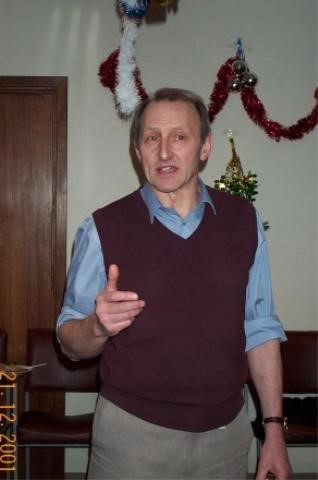
Professor Thomas (Tom) B Bolton, Professor of Pharmacology, died on 27May 2024 after a short illness. Tom joined St George's Hospital Medical School (as we were then) in 1976 as a Senior Lecturer in the Department of Pharmacology and Clinical Pharmacology.
Within four years he became a Professor and five years later he became Head of the Department of Pharmacology and Clinical Pharmacology. He remained the Head of Department until St George’s, University of London was reorganised.
Tom later spent four years as the Dean of Research and Development at St George’s. He served on Wellcome Trust and British Heart Foundation grant panels and was chairman of a Higher Education Funding Council Basic Medical and Dental Science Research Assessment Exercise panel. He was a member of the British Pharmacological Society, Physiological Society, Biophysics Society, Save British Science, Biochemical Society, University Federation Animal Welfare and Royal College Veterinary Surgeons. In 1998 he was elected to Fellowship of the Academy of Medical Sciences in recognition of his outstanding contributions to medical science.
Before St George’s
Tom was a Yorkshire man who obtained a First-Class Honours BSc in Physiology at the University of London in 1964 and a PhD in Pharmacology in 1967 – his examiner being the Nobel Laureate Sir John Vane. He subsequently completed a Bachelor of Veterinary Medicine and was admitted to the Royal College of Veterinary Surgeons as a practising veterinary surgeon. He remained active as a vet and covered the St George’s Biological Research Facility until its closure. However, Tom dedicated most of his working life to teaching, research and university leadership. He became interested in smooth muscle research through his time at the Department of Pharmacology Oxford University where he was a Royal Society Locke Research Fellow at Brasenose College.
Research interests
Tom built a world-leading smooth muscle research group, “The Smoothies”. The group specialised in understanding ionic events and the associated ion channels of smooth muscle cells. These cells quietly, subconsciously, but critically, determine movements of fluids and substances in tubes and containers throughout the body. Tom’s group was in the vanguard of research that utilised new technologies – single cell patch clamp electrophysiology, laser confocal imaging - and he established many international collaborations as a consequence. Many of the people who trained with Tom went on to senior positions across the globe fuelled by his relentless work ethic. Investigators inspired by him were from countries including Australia, Bulgaria, China, France, Germany, Japan, Slovakia and Ukraine, whom he supported in many ways.
In the mid-1980s to late 1990s Tom’s group was one of the leading smooth muscle centres in the world and contributed to St George’s strong reputation for research deciphering physiological mechanisms. Tom was particularly interested in ionic events evoked by acetylcholine acting on intestinal smooth muscle cells to regulate intestinal motility. You can read more about Tom’s research and the impact of The Smoothies at the bottom of this obituary.
About Tom
In the twilight of his academic career Tom represented St George’s in the development of a Pharmacy degree with Kingston University that still runs. In 2011, Kingston University awarded Tom an Honorary Doctorate in recognition of his outstanding contributions. At the ceremony, he said:
"I would say there are no short-cuts. Understand everything you do 100 per cent at each and every stage, be prepared to work long hours, be almost zealot-like in your approach, learn how to fight off bureaucrats - only then will you have the drive and knowledge to succeed."
Those who knew Tom will recognise his character from this statement and remember him fondly. He was a yardstick of quality.
Tom was a ferocious competitor, be it on the squash court, in a 5-a-side pitch or lifting weights in the gym. He loved driving high-end cars, which he serviced himself, and was a big fan of curries. A DIY enthusiast, Tom repaired, improved and extended his house in South Nutfield. He also had an old tractor that he used to mow the grass in the field where his rather intimidating doberman pinscher dogs could exercise. He was indefatigable in battling against any authority, including water companies, banks, hospital trusts and social services. Tom was a ‘can do’ person and he inspired many others do be the same.
Professor of Vascular Pharmacology, Iain Greenwood, worked alongside him as his Deputee to develop the Kingston Pharmacy degree. Reflecting on his time working with Tom, he says:
"As a PhD student working in another institution, I was told ‘practice your talk well because Tom Bolton is likely to be present’’. It was a mark of respect for his scientific veracity and the quality of his science. When I came to St George’s I was never in Tom’s group but was fortunate to associate with them and to join in the various social events.
“It was a vibrant, eclectic experience. In later years as a Senior Lecturer, I worked with him on the development of the Kingston Pharmacy degree. It was always enjoyable although the trip to Kingston in his high-end Subaru was not recommended if you were of a nervous disposition.”
Tom and The Smoothies – research and impact
Tom described membrane depolarising effects and was fascinated by the underlying mechanisms studied by microelectrodes and voltage-clamp. He applied newly emerging patch clamp and cell isolation techniques to prove that underlying the depolarization was a non-selective cationic transmembrane inward current. He showed the relationship with intracellular calcium concentration, roles of G proteins and types of muscarinic receptor. He showed the voltage-dependence of the ionic mechanism and pointed to the role of non-selective cationic channels that are now known as Transient Receptor Potential or TRPs. He showed that the principles were relevant to the actions of other transmitters such as noradrenaline on arterial smooth muscle cells. He inspired the field with seminal review articles on the mechanisms of action of transmitters and other substances and excitation-contraction coupling in smooth muscles.
Tom and colleagues recognised that the depolarizing effect did not occur in isolation. His team identified spontaneous transient outward currents (STOCs), properties of calcium stores and transient outward currents and calcium release events induced by inositol 1,4,5-trisphosphate. He introduced new calcium imaging techniques to observe the calcium events and their subcellular distribution in real-time and crosstalk between different types of intracellular calcium-release channels. Tom and his team combined confocal laser scanning microscopy with simultaneous patch clamp recordings for direct visualization of subcellular calcium signalling targeting ion channels in vascular and visceral smooth muscles, thus further developing his “local calcium control” concept. His group described depolarization-activated calcium currents and the counterbalancing potassium channel mechanisms. As such his group was one of the first to characterise calcium-activated potassium channels and delayed rectifier potassium channel current. Tom’s group also identified two types of adenosine triphosphate-sensitive potassium channel in smooth muscle, one of which was activated by nucleotide diphosphates. They were amongst the first to describe endothelial-dependent relaxant mechanisms that regulate adjacent smooth muscle cells and interstitial cells in the vascular wall.
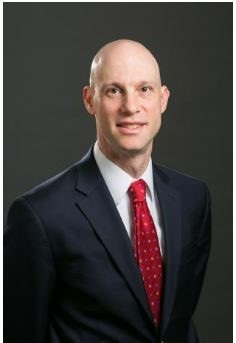
Daniel R. Goldstein, M.D., aged 56, died on May 21, 2024, with his family by his side after a long battle with a rare cancer. Dr Goldstein graduated from St. George’s, University of London, before undertaking a medical residency at Johns Hopkins Bayview Medical Centre in Baltimore, Maryland, and training in cardiovascular disease, heart failure, and transplantation at the University of Alabama, Birmingham (UAB). After completing his medical residency and research fellowship training, Dr Goldstein joined Yale University School of Medicine in New Haven, Connecticut, as an Assistant Professor in Internal Medicine. He was promoted to Associate Professor in 2007 and to Professor in 2013. In 2016, Dr Goldstein joined the faculty at the University of Michigan as the endowed Eliza Maria Mosher Professor of Internal Medicine and a Research Professor in the Institute of Gerontology. In 2017, he became the Leader of the Michigan Biology of Cardiovascular Aging Program at the Frankel Cardiovascular Centre. From 2021 to 2023, he served the field with distinction as the Editor-in-Chief of The Journal of Heart and Lung Transplantation. He was a member of the American Society of Clinical Investigation, a Paul Beeson Scholar in Aging Research, and a recipient of an Outstanding Investigator R35 Award from the National Heart, Lung, and Blood Institute.
A renowned physician-scientist and cardiovascular aging expert, Dr Goldstein was continuously funded by the National Institutes of Health for over 20 years and published more than 150 peer-reviewed articles over the course of his 30-year career. Dr Goldstein significantly influenced the medical profession through his leadership and research in the fields of cardiology and immunology, particularly focusing on the interplay between inflammation, aging, atherosclerosis, and organ transplantation.
Dr Goldstein is remembered by loved ones for being a deeply principled man who believed in equity and the advancement of women in leadership positions in science. He wanted the scientific community to benefit from his experiences fighting metastatic adenoid cystic carcinoma and published an editorial in the Journal of Heart and Lung Transplantation in October 2023 outlining his treatments. In the last months of his life, he fought valiantly in a phase I clinical trial to advance treatment for adenoid cystic carcinoma.
Dr Goldstein was best known for his excellence in teaching and mentoring physicians and scientists at all career stages. Friendly, curious, and always willing to talk or listen, he shared his wisdom and insights with students who were fortunate to benefit from his innovation, energy, and friendship.
He was a devoted and engaged father in the lives of his two children, encouraging their interests outside of school, whether it be tennis, guitar, or soccer. He shared with them his lifelong love of football and his team, Tottenham Hotspur FC; and he fully embodied their Latin motto: Audere est Facere, "To dare is to do."
Daniel Goldstein is survived by his wife of 24 years, Grace Jenq, M.D., and his children Ben and Mia. He is also survived by his mother, Henrietta Goldstein; sisters, Alison Fredericks and Nathalie Fricker, and brother-in-law Colin Fricker ; plus six nieces and nephews (Alexander, Charlotte, Joshua, Sebastien, Zachary, and Emilie). In lieu of flowers, the family welcomes donations to the Adenoid Cystic Carcinoma Foundation or to a new M-BOCA Leadership Development Fund to be established at the Frankel Cardiovascular Center.
Daniel will be remembered as a true friend, a superb faculty member and mentor, a beloved son, husband, and father, and an inspiration to all. His memory will truly be for a blessing.
Born 19 April 1929, died 1 February 2024, age 94
Douglas was born in Mill Hill, London to Dr Gordon and Mrs Ivy Muriel Millar. In 1931 Gordon gave up his practice in Mill Hill to move to Tottenham, North London to take over the practice of his father, Dr William Millar who had died. The Millar family remained in Tottenham, with the exception of the early war years until 1948. During the Blitz Douglas lived with his mother, godmother, aunt, brother and sister near Welwyn, while his father stayed in London running his mobile surgical ambulance throughout the Blitz, ably supported by his retriever “Sandbags”.
His early schooling was in London and at age 13 he went to Aldenham School, Radlett where he played Cricket and Hockey and was school Captain.
In 1946, somewhat inevitably as his Father and Grandfather were both GP’s, Douglas left school to read medicine at Kings College, London, and then went to St George’s Hospital at Hyde Park Corner to complete the MBBS. Whilst training at Kings College and St George’s clearly took priority, he also played a great deal of sport, particularly hockey and cricket. He captained a combined London Universities and United Hospitals hockey team on a tour to Germany, the first post-war British hockey team to tour Germany. Incorrectly billed in Frankfurt as Great Britain vs Germany, they played in front of a ‘vociferous’ large crowd. It was an enjoyable tour, but sometimes quite challenging for a 20-year old. For example, in speeches at a formal reception he was asked by the Mayor of Frankfurt to explain why civilian districts had been targeted in the war; and he also stayed with the family of a former U-boat commander.
He qualified MBBS in 1951 as well as MRCS, LRCP London. His first year after qualifying was spent at St George’s doing Medicine, Surgery and then Casualty.
In 1953 he decided to do his National Service in the Navy, following his father, and joined the new destroyer, HMS Defender, as acting Surgeon Lieutenant. Their first duty was the Spithead review after the Coronation of Queen Elizabeth II and the next day they sailed for Japanese and Korean waters where for the next 18 months he was sole MO for a crew of 250+ as they patrolled the Korean, Hong Kong, Chinese and Malaysian coasts during latter stages of the Korean War and then beyond the armistice. His many exploits included helping locals/police on small boat sorties into HK to treat locals, chasing pirates in the straits of Formosa (similar to his father's exploits in 1919), accompanying fully armed, combat boarding parties - as MO, dressed in tropical whites - and various other outings, before HMS Defender steamed up the Johor river to support the army “clearing out the last of the communists” as part of the “Malay emergency”. He saw much pathology through doing clinics in many different places. There were also opportunities to play cricket and hockey whilst in Hong Kong, and other highlights included being given the controls of a Sunderland flying boat on a RAF patrol on the west coast of Korea (he had flown a Tiger Moth at school) and, at the age of 25 returning home in late 1954 on a troopship, performing an appendicectomy on a sailor in the middle of the Indian Ocean.
After National Service he returned to St George’s to pursue surgical training, working on the Surgical and Thoracic units, being an Anatomy Prosector at the Royal College of Surgeons and registrar at the London hospital and Black Notley Hospital near Braintree. He passed the FRCS in London and Edinburgh in 1958. In 1960 he became a Senior Registrar at St George’s and worked in a number of specialties including paediatric surgery, plastic surgery, breast and thyroid surgery, urology, vascular surgery and latterly, coloproctology with Sir Ralph Marnham and Prof Bryan Brooke. He also spent a year at the Royal Hampshire County Hospital in Winchester, where several St George’s senior Registrars had worked.
He met his wife, Sally in 1957 when she was working in outpatients, and who became the youngest ward sister St George’s had had. They were married in 1960 after Douglas came back from a 6 week tour of the Middle East (Iran, Iraq, Jordan and Cyprus) as Assistant Surgeon to Mr Victor Riddell, organised by the British Council to operate and lecture. They had three children, Malcolm, Clare and James.
In 1967, he was appointed as Consultant Surgeon to the St Helena Hospital Group in Colchester, Essex, with beds and operating sessions at the Essex County Hospital, and Black Notley Hospital at Braintree where he had been a registrar, when training at the London Hospital. He also had out-patient clinics at Halstead and Clacton.
It was a typical DGH covering a large area with a population of 250,000 and only four general surgeons and he quickly established himself as a competent general surgeon with particular interests in Breast surgery, Colorectal problems and Vascular work. He was a brave surgeon and would take on anything that needed to be done.
His particular contributions were in Breast surgery where he realised that segmental excision followed by radiotherapy was appropriate management for many patients and avoided the cosmetic results of the more radical traditional surgery. He kept records of 130 patients treated in this way.
Also, at that time the radiotherapy unit in Colchester had adopted the Manchester Selectron radiotherapy treatment for some gynaecological cancers, causing significant problems of bowel, bladder and pelvic damage from the radiation. A number of patients had very troublesome fistulae and Douglas recognised this as a complication and was instrumental in stopping the treatment. He also created a Uro-ileostomy procedure which bypassed the fistula and considerably helped these patients and wrote about it and presented his results nationally and abroad.
Douglas was President of the Coloproctology section of the Royal Society of Medicine, a Member of the Council of the RSM, President of the Colchester Medical Society in 1974, President of the St Marks Hospital Association, Fellow of the Association of Surgeons of Great Britain and Ireland, Hon Surgical Tutor at the Charing Cross and Westminster Hospitals and Surgical Tutor for the RCS in the North East Essex Hospitals Region. After he retired in 1992 he served on Medical tribunals as an expert witness in the east of England area.
He was always a keen sportsman, being a good cricketer and Hockey player when younger. He had been Captain of London University Hockey from 1947 to 49. He also played 1st XI hockey for Hampshire, Surrey, Middlesex and Hertfordshire, the East of England, the Anglo Scots and for Scotland, for whom he won a cap against Wales in 1956. He played Cricket for United Hospitals to minor counties level, and in Colchester played into his 50’s, playing for Gents of Essex and captaining the Hoboes CC for 3 years, touring Belgium and Holland. He was an extremely competitive sportsman in all he did. Along with golf and painting, he continued his sailing throughout his retirement racing in local and North Sea races, and in later years cruising the East coast widely, as well as the Med with old friends.
Above all he was a devoted family man to his wife and family. Throughout his life, he was guided and supported by Sally who in her own right had a full and satisfying career, latterly in Colchester as RN for St Helena Hospice and then as a Samaritan for many years. On every wedding anniversary, Douglas gave Sally a single red rose - a past St George’s tradition that he continued up to her death in August 2023 at 87, placing the last rose on her coffin. Whilst his health deteriorated after that, he was able to stay at home and was looked after by his children and devoted carers.
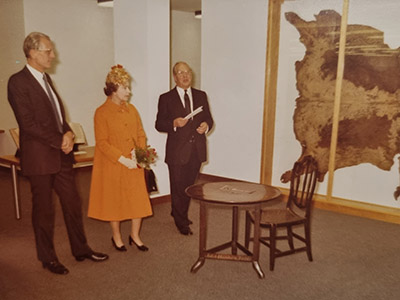
It is with sadness that we share the news of the recent passing of former Dean of Students at St George’s, University of London, Dr Robert Lowe. Dr Lowe played a prominent role at St George’s, overseeing the university’s move from Hyde Park Corner to Tooting during his tenure.
Dr Lowe was Dean of Students from July 1970 until his retirement at the end of July 1982, at which point he also held the position of Secretary of St George’s. A month prior to his retirement the university’s sports centre was opened bearing his name which endures to this day.
However, it is the University’s move to its current site in southwest London which is arguably Dr Lowe’s lasting legacy. Our unique location, which helps our students develop their multidisciplinary understanding and develop vital skills for a career in healthcare, is testimony to the vision and hard work of Dr Robert Lowe during his twelve years as Dean.
Construction of our current home began in 1973 and was formally opened on 6 November 1980 by the late Queen, Her Majesty Queen Elizabeth II (pictured between Robert [left] and Harry Axton [right] at the opening below).
In retirement, Robert continued to challenge himself including once sailing a small boat to New Zealand.
If you would like to share a message of condolence, you can do so by emailing alumni@sgul.ac.uk.
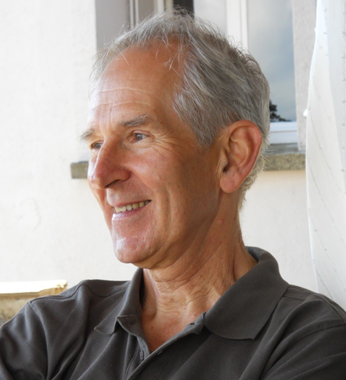 St George’s Medicine alumnus, Dr Andrew Polmear, was born in Aylesbury and grew up in Whitstable.
St George’s Medicine alumnus, Dr Andrew Polmear, was born in Aylesbury and grew up in Whitstable.
In 1963, Andrew was awarded a scholarship to read History at Corpus Christi College, Cambridge. He later chose to study A-Levels in Biology, Chemistry and Physics in order to complete a Medicine degree, studying at St George’s, University of London and graduating in 1971. He continued to stay connected to the university as an alumnus and supporter.
Andrew had a distinguished medical career both as practitioner and teacher. After taking on junior jobs at the Royal Hampshire County Hospital, Southampton General Hospital, St James’, Balham and St George’s, he spent three years from 1974-77 in Hong Kong. During his time there, he helped set up the Medical Department in the newly-built United Christian Hospital in what was then the refugee area of Kwun Tong.
On his return to the UK, Andrew qualified as a GP and practised in Hove for almost 20 years before moving to the University of Sussex, where he remained until retirement. He set up the Academic Unit of Primary Care at the university, which was one of the building blocks of the Brighton and Sussex Medical School. In recognition of his work, he was made a Fellow of the Royal College of Physicians.
Andrew also co-wrote six editions of the highly acclaimed ‘Practical General Practice’ with Alex Khot, one of his former GP trainees, as well as writing ‘Evidence-Based Diagnosis in Primary Care: Practical Solutions to Common Problems’. The book won First Prize in the Primary Care Category in the 2009 British Medical Association Book Awards.
Outside of Medicine, Andrew had a love of Music which began at a young age. During his time at school he was a Chorister, and subsequently Senior Chorister, at Canterbury Cathedral before being awarded a music scholarship to The King’s School Canterbury. He was an accomplished cellist and continued to play in a string quartet and piano trio until just weeks before he passed away.
He was also involved in setting up ‘Strings Attached’, the Brighton and Hove chamber music society, and wrote about both music and wine for local publications.
Andrew was an avid traveller and enthusiastic walker who loved the South Downs. He also loved gardening, and particularly enjoyed spending time on the garden at the home in the Languedoc that he shared with his wife, Margaret, for over thirty years.
Andrew is survived by Margaret, his older brother Jeremy, and his younger sister Caroline.
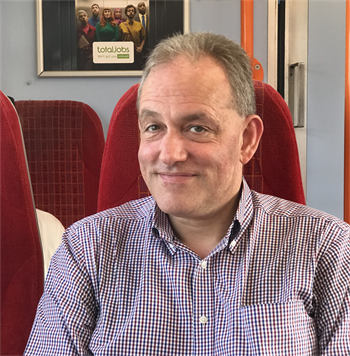 It is with great sadness that we share the news that Mike Smith, a former Deputy Director of Finance at St George’s, has passed away.
It is with great sadness that we share the news that Mike Smith, a former Deputy Director of Finance at St George’s, has passed away.
Mike was well-known to many of our alumni and worked closely with the Students’ Union (SU) to ensure investment in, and substantial development of, the University’s bar, retail and recreational areas.
He also completed a business case which ensured that St George’s and the SU kept control of the service and rents at Horton Halls, our Halls of Residence, and that these areas were not outsourced to other providers. This helped assure both the high quality and affordability of the residence.
Mike set up the first SU lease for the space on the ground floor and the second floor to ensure security and continuity for the SU well into the future, and was made a life member of the SU back in 2009 in recognition of his ongoing support.
Reflecting on his friendship with Mike, SU Bar Manager Richard Ison says:
“Mike frequented the bar and other SU areas and always had time to join in and support SU events. He was a regular at the annual SU Summer Balls and even joined in some of the student events.
“I remember Mike having a penchant for paperwork – otherwise known as hoarding! If you ever wanted any committee meeting papers, Mike kept them all on his desk, under his desk and on every horizontal surface in his office.
“Mike loved his two children, James and Josh, and was interested in anything with a motor - especially high-performance British sports cars. He had amazing sense of humour, a raucous and contagious laugh and a lovely friendly way about him.”
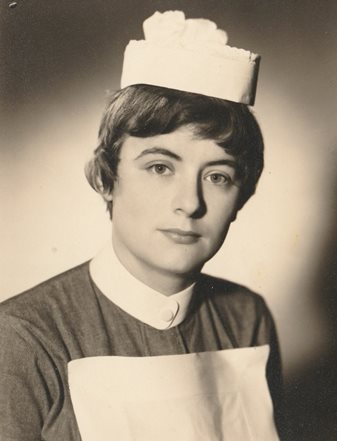
It is with deep regret that we have to inform you that Gay Lucas died on 4 November from complications of Sepsis.
Many of our alumni will remember Gay from their time at St George’s. She worked at the former St George’s Hospital Medical School site on Hyde Park Corner as Staff Midwife, during which time she taught many students to deliver babies. She later spent many years in Family Planning, and as a Practice Nurse.
Gay married Class of 1965 Medicine alumnus, Dr Terry Brown, supporting him throughout his Career in Medicine and Radiology.
She loved Classical Music and cookery, becoming Cookery Judge for the Women’s Institute.
If you would like to share any words of condolence with Dr Brown, please email alumni@sgul.ac.uk.
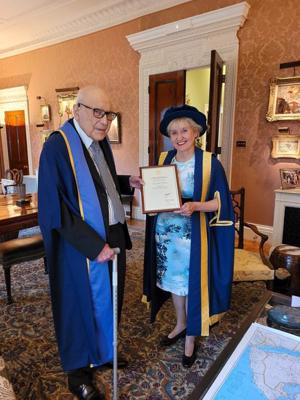
Remembering Sir Joseph Hotung, a major benefactor of St George’s, University of London and recipient of an honorary doctorate from the university, who passed away on 16 December 2021 at the age of 91.
Born in 1930, Sir Joseph was a philanthropist and businessman who contributed greatly towards research at St George’s, both for the hospital and the university. He funded research into molecular immunology and HIV/AIDS at the university, while the Sir Joseph Hotung Centre provides a facility for musculoskeletal treatment, research, and education on the hospital site.
Sir Joseph was awarded an Honorary Degree of Doctor of Science (Medicine) by St George’s, University of London in recognition of the impact that his funding has had on research at the university. His contributions were recognised in a small ceremony at his home on Tuesday 14 September 2021, which was attended by Professors Jenny Higham, Jon Friedland, Julian Ma and George Griffin. The Honorary Degree also celebrated Sir Joseph’s time serving on the University board, during which he contributed his global experience and insight as a Council Member.
At the award ceremony, Sir Joseph shared:
“I’m deeply honoured to be receiving this award. My association with St George’s, of which I am very proud, goes back many years, in particular with Professor Julian Ma and Professor George Griffin. I take this opportunity to wish you every success in all your future endeavours.”
In 2003, Sir Joseph funded the building of critical high containment laboratories for research into HIV at the university, along with existing laboratory refurbishments and support staff. Two Hotung Chairs in Molecular Immunology and Molecular Vaccinology were also endowed to the university for 10 years as part of the investment - going to Julian Ma and Martin Cranage respectively.
Most recently, Sir Joseph invested further into Professor Ma’s Hotung Molecular Immunology Laboratory to develop plant-based manufacturing for antibodies to prevent Mother-to-Child Transmission of HIV. This helped cement the group’s position as an international leader in the field of Plant Biotechnology for Human Health. Thanks to his funding, the researchers are close to starting clinical trials for a ground-breaking antibody product, produced in plants, to prevent the spread of HIV from pregnant mothers to their unborn children.
Speaking about this work, Professor Ma, Director of the Institute for Infection and Immunity at St George’s, said: “The investment by Sir Joseph is the reason why I came to St George’s. His funding enabled me to set up a laboratory and state-of-the-art plant growth facility to build my research team and develop novel treatments to tackle HIV.
“I am tremendously grateful for the support Sir Joseph has given me during my time at St George’s, and we will continue to honour his life by pursuing the ambitious goals set for our research.”
The impact of the support St George’s has received from Sir Joseph is extensive. Over 30 students have been awarded PhDs for their work in research groups that Sir Joseph has funded and many more have been inspired through their contacts with Hotung-funded staff. In addition, over 100 important scientific publications have been published from St George’s acknowledging the support of the Hotung Charitable Foundation.
Professor Jenny Higham, Principal, commented: “Support from Sir Joseph has been pivotal to St George’s in the past 20 years, both through his financial support and his guidance and intellectual input.
"He has left an indelible mark on research and education at the university that will have a global impact for years to come, through the students he has supported and the patients whowill benefit from his research investments.”
Sir Joseph will be dearly missed by his family, many friends and colleagues, and is survived by his children Joseph, Patrick, Ann and Ellen and their families, as well as his sister Antonia.
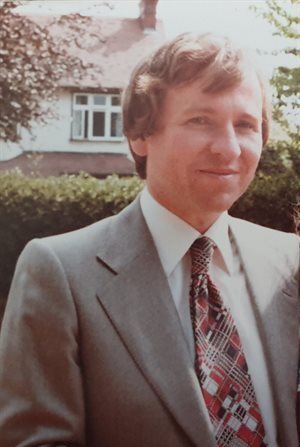
It is with great sadness we announce the death of Dr Michael Warburton who worked in the histopathology department at St Georges Medical School for about 20 years, until he retired approximately 10 years ago.
Dr Warburton was born in Manchester on 9 January 1948. He studied Biochemistry at Cardiff University where he met his future wife, Gill, before completing his PhD at Manchester University. He followed Gill to America in 1975 and spent two years working at Rockefeller University. He enjoyed travelling around the USA and Mexico while he was there. Returning to London, he married Gill in 1978 and went on to have 2 sons, Andrew and Ben, and recently one granddaughter, Cora.
Dr Warburton worked at the Imperial Cancer Research Fund and Ludwig Institute before joining St George's medical school. He was forced to retire prematurely due to ill health but loved his time at St George's and would often meet former students during his hospital appointments, which brought a smile to his face.Outside work, Dr Warburton loved Manchester City and steam trains and had a thirst for knowledge and reading.
Our condolences go to his family at this difficult time.
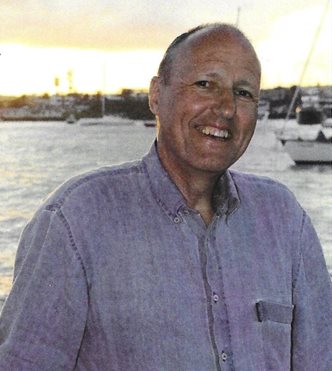
We are sad to report the death of William Brough, who qualified in medicine at St George’s in 1976. William was appointed Consultant General Surgeon to Stepping Hill Hospital, Stockport in 1989 and to Macclesfield District General Hospital in 2001, where he remained until his retirement in 2011.
He had a strong, established reputation in laparoscopic surgery, lecturing and demonstrating both nationally and internationally.
From 1978 to 1985, he took on positions as Senior House Officer and Registrar in Hull, Cambridge and Manchester. He went on to become Senior Registrar in Manchester in 1985, spending a year in Melbourne as part of his role.
William’s work was widely-published and he took an active role in several medical associations and societies. He was a member of ten professional organisations, including the Association of Gastrointestinal Surgeons (AUGIS) and The Association of Endoscopic Surgeons, and was a council member of five of these. William was also an examiner for the Royal College of Surgeons, a member of the 1921 Surgical Club and President of the surgical section of Manchester Medical Society.
William was a keen and talented sportsman, playing cricket in his younger years and later taking up golf, alpine walking, skiing, and cycling. He also had a pilot’s licence.
He sadly developed Alzheimer’s disease in 2016, during his retirement. He is survived by his wife, Sylvia, a now retired GP, his children, Tom and Claire and three grandchildren. If you would like to offer your condolences, please email alumni@sgul.ac.uk.
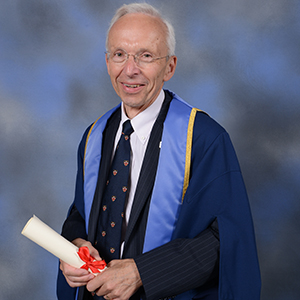
It is with great sadness that we report the death of our previous Principal, Professor Peter Kopelman.
Professor Kopelman’s association with St George’s, University of London began when he studied medicine here as an undergraduate, and in a long and distinguished career became its Principal (2008 to 2015). He later spent a year as Vice Chancellor of the University of London from 2018-19.
Prior to his appointment at St George's, he was Vice-Principal of Queen Mary, University of London.
He was an outstanding supporter of St George’s for many years, receiving an honorary Doctor of Science degree in 2017.
Principal Professor Jenny Higham said:
“Peter was a loyal friend of St George's and our community is deeply saddened by his passing. I last saw Peter here at the university at the opening of our Curve lecture theatre in February 2020. Looking back, it was a treasured opportunity to talk again about our experiences in the role of Principal. Our thoughts are with his family and all those who knew Peter well.”
Professor Andy Kent, Dean of Joint Faculty with Kingston, University of London said:
“I will always remember Peter with great affection. He had an easy charm and a warm sense of humour, and that enviable capacity to make whomever he was talking to feel the centre of his world. He was always terrific company, with many stories to tell.
"Stand out memories include watching him impersonate Rocky running up the steps of Philadelphia’s Museum of Modern Art in his pinstripe suit during a break from negotiations with Thomas Jefferson University.
"It is with huge sadness that I learnt of his death. My thoughts are very much with Peter’s wife Sue, herself a huge friend to St George’s over many years, and their children, of whom Peter was so very proud.”
Professor Kopelman had a long-standing interest in diabetes care and initiated a district-wide scheme for integrated care in East London. He was active in health policy, medical education and research.
Professor Kopelman was chair or deputy chair of several national university committees and a member of NHS national policy and workforce committees.
He chaired the Clinical Examining Board of the Royal College of Physicians, the Royal Pharmaceutical Society Faculty and Education Board and Health Education England’s Oversight Board for Medical Associate Practitioners.
Professor Kopelman’s major research interest was in the field of obesity, in particular endocrine aspects and possible genetic determinants. He was also interested in the pathophysiology of associated complications and their management.
He was a past chairman of the Association for the Study of Obesity, President of the European Association for the Study of Obesity, a Trustee of the International Association for the Study of Obesity and a member of the Department of Health and Food Standards Agency Scientific Advisory Committee on Nutrition.
He was also a member of the Chief Medical Officer’s Working Group on physical activity. He was chair of the Royal College of Physicians Committee on Nutrition and chaired the College’s Working Party on the management of obesity with particular reference to drug therapy. He also chaired the Royal College of Physicians’ Working Party on nutritional care of patients that resulted in the publication of a report entitled Nutrition and Patients – a Doctor’s Responsibility.
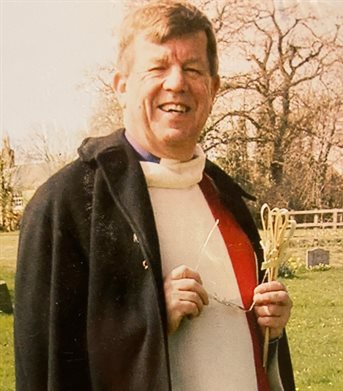
The Rev'd Canon Ian Ainsworth-Smith, Chaplain at St George's Healthcare NHS Trust, sadly died in March this year. He served at the Trust for 33 years from 1973- 2006, during which he interacted with many staff at St George’s, University of London. He made significant contributions to both the Clinical Research Ethics Committee and the Clinical Ethics Committee, later becoming its Chairperson.
Canon Ainsworth-Smith was also a clinician and trained Psychotherapist, specialising in eating disorders and taking on patients referred to him by the Psychiatry Department. He ran therapy groups when St George‘s had its own Psychiatry Unit, as well as teaching communication skills to medical students to help them approach difficult situations such as breaking bad news. ‘Letting Go’, his book on the care of the dying and the bereaved (which he co-wrote with Peter Speck), was published in 1982 and is still in print. The book’s success resulted in many invitations to speak publicly.
Canon Ainsworth-Smith received casualties following the Hyde Park bomb blast in July 1982, offering pastoral care for people injured in severe traumatic circumstances. He later played a central role in providing emotional support to those injured, or waiting for news on injured loved ones, during the 1988 Clapham Rail Disaster – one of the biggest challenges St George’s Hospital had ever faced. Canon Ainsworth-Smith later worked in the staff debriefing and support groups and was a key member of the committee charged with distributing the money raised to help the injured and bereaved. He participated in the annual memorial services for the rest of his time at St George’s.
In this tribute below, Canon Ian Ainsworth-Smith's friends and colleagues, Rev’d Canon Hilary Johnson (his successor) and Professor J Hubert Lacey, share their memories of him.
“It is fair to say that Ian was the most known and approached person in the St George’s group of hospitals and its Medical School. He was ideally suited to the role of Chaplain; his intelligence, emotional warmth and pastoral heart, meant that he was welcomed by staff and patients, especially at crisis moments in their lives. Ian’s rich and varied ministry includes his pioneering work with parents experiencing a miscarriage or stillbirth. He gathered a number of empathetic midwives around himself and worked with them to revolutionise the way the needs of these grieving parents are understood and addressed.
“He was a welcome guest of The St George’s Nurses League at their twice-yearly meetings, especially at the Meeting held each year on St George’s Day, which was followed by a well-attended Service in the Hospital Chapel.
“Ian was the best of colleagues, very supportive and always adaptable. He enjoyed training potential healthcare Chaplains, and he was an excellent mentor for several lead Chaplains from other teaching hospitals. Ian was active in the movement for the ordination of women – even narrowly avoiding being arrested during a demonstration on the steps of St Paul’s.
Ian married his wife Jean in 1965, after meeting in Cambridge where they were both members of the Cambridge University Gilbert & Sullivan Society. Jean was singing in The Mikado and Ian was her makeup man. He always said that when he looked into her eyes, that was it! They were a team throughout and were always seen as two halves of a whole. Once they had both retired, they moved to Somerset. Ian remained very much in-demand, not only for ecclesiastical duties but also ethical advice and as a lecturer and Chaplain on cruises. Accompanied by Jean, he visited every continent including Antarctica.
“Ian was the best of colleagues. He understood hospitals and the stresses endemic within them as few others did. He epitomised the kind, caring knowledgeable chaplain who always seems to be there when needed and at the right time.”
Canon Ainsworth-Smith is survived by Jean and their sons, Mark who is a Consultant Pre-Hospital Care Practitioner and Richard who is a Metropolitan Police Officer.
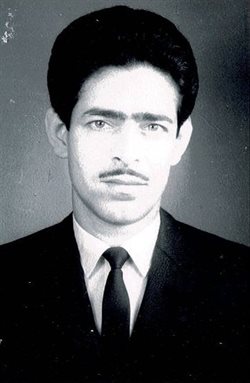 PhD Alumnus and Reader in Medical Microbiology, Dr Dilip Banerjee, sadly passed away in January 2021 from an aortic dissection. Dr Banerjee will be fondly remembered by the St George’s community, with many speaking of his kindness, generosity, and his ability to bring his subject to life for his students.
PhD Alumnus and Reader in Medical Microbiology, Dr Dilip Banerjee, sadly passed away in January 2021 from an aortic dissection. Dr Banerjee will be fondly remembered by the St George’s community, with many speaking of his kindness, generosity, and his ability to bring his subject to life for his students.
Dr Banerjee was born in Rajshahi, formerly in India but now in Bangladesh. The death of both his mother and brother of tuberculosis when he was six years old, led him to dedicate much of his career to the eradication of the disease. After studying Medicine at Calcutta National Medical College, Dr Banerjee went on to be one of the founders of Students Health Home in Kolkata, still active today, which provides free healthcare and medication to those in need. After working there, he moved to the All India Institute of Medical Sciences in Delhi, where he met his wife, who was an Assistant Research Officer at the Institute at the time. They married in 1967 and moved to the UK the following year for Dr Banerjee to complete his PhD in Medical Microbiology at St George’s.
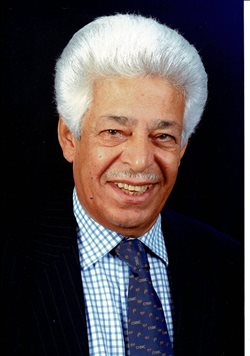
Dr Banerjee’s career at St George’s, University of London spanned 34 years. He started at St George’s as a Research Registrar and PhD student at our former campus on Hyde Park Corner, later moving to the Tooting Campus as staff. He began his career here as a Consultant Microbiologist, publishing ‘Microbiology of Infectious Diseases’ (a pocket book for medical students) in 1985. Friends and family speak of his love and passion for his work at St George’s, where he was treated before his death.
Former student, Dr Philip Strike, says of Dr Banerjee:
“Dilip Banerjee possessed the amazing ability to explain complexities of Microbiology to medical students with patience and clarity whilst always being engaging and entertaining. His book for undergraduates was very possibly the thing that got me through my pathology exams.
"I was fortunate enough to get to know him better several years later and he was always warm and welcoming. He always had interesting things to say and was interested in other people and their views and experiences. He was a gentle, kind and generous man and I will miss him very much.”
In 1994, Dr Banerjee became a university Reader in Medical Microbiology, a position which he held until he retired in 2001. In the 1990s, Dr Banerjee introduced genetic fingerprinting to map the epidemiology of tuberculosis in London, significantly improving ‘tracking and tracing’ of the disease. This research helped determine factors contributing to the spread of tuberculosis and highlighted a need for increased primary healthcare and public health control measures. He also led the Undergraduate Microbiology teaching and the Clinical Pathology training programmes at the university.
Class of 1987 alumnus, Tom Hyde, says: “Microbiology wasn't the most exciting topic on the curriculum for me. I saw it as boring until we began our practical sessions with Dilip. The man behind the book was an enigma. A shock of white hair with a white coat, he was ahead of his time - ‘Back to the Future’ had not even been released!
"His passion, enthusiasm and ability to inspire young students was incredible. He brought the subject to life - a truly inspirational man and teacher. I will remember him as hugely warm, caring and generous.”
As well as writing and speaking internationally about his research into tuberculosis, his work on leprosy informed a subsequently internationally-recognised triple therapy for the disease. In later years, he became Chair of Pathology Services and Clinical Director of Diagnostic Services, in St George’s Hospital as well as a fellow of the Royal College of Pathologists.
A close colleague and friend, Professor Philip Butcher (currently Professor of Molecular Microbiology at St George’s Institute for Infection and Immunity) says: “Dilip had been my wise and supportive mentor and was a central and much respected colleague across St George’s University and Hospital. He was the quintessential clinical academic - doctor, teacher and scientist”.
Throughout his life, Dr Banerjee had a passion for travel and making friends.
His daughter, Dr Shrilla Banerjee, speaks of his love of socialising and meeting new people:
“Whenever he and my mother went on holiday, they would come back with new friends. The consultants treating him at St George’s all spoke of how they knew him as a St George’s legend, who would be well-remembered by everyone here.”
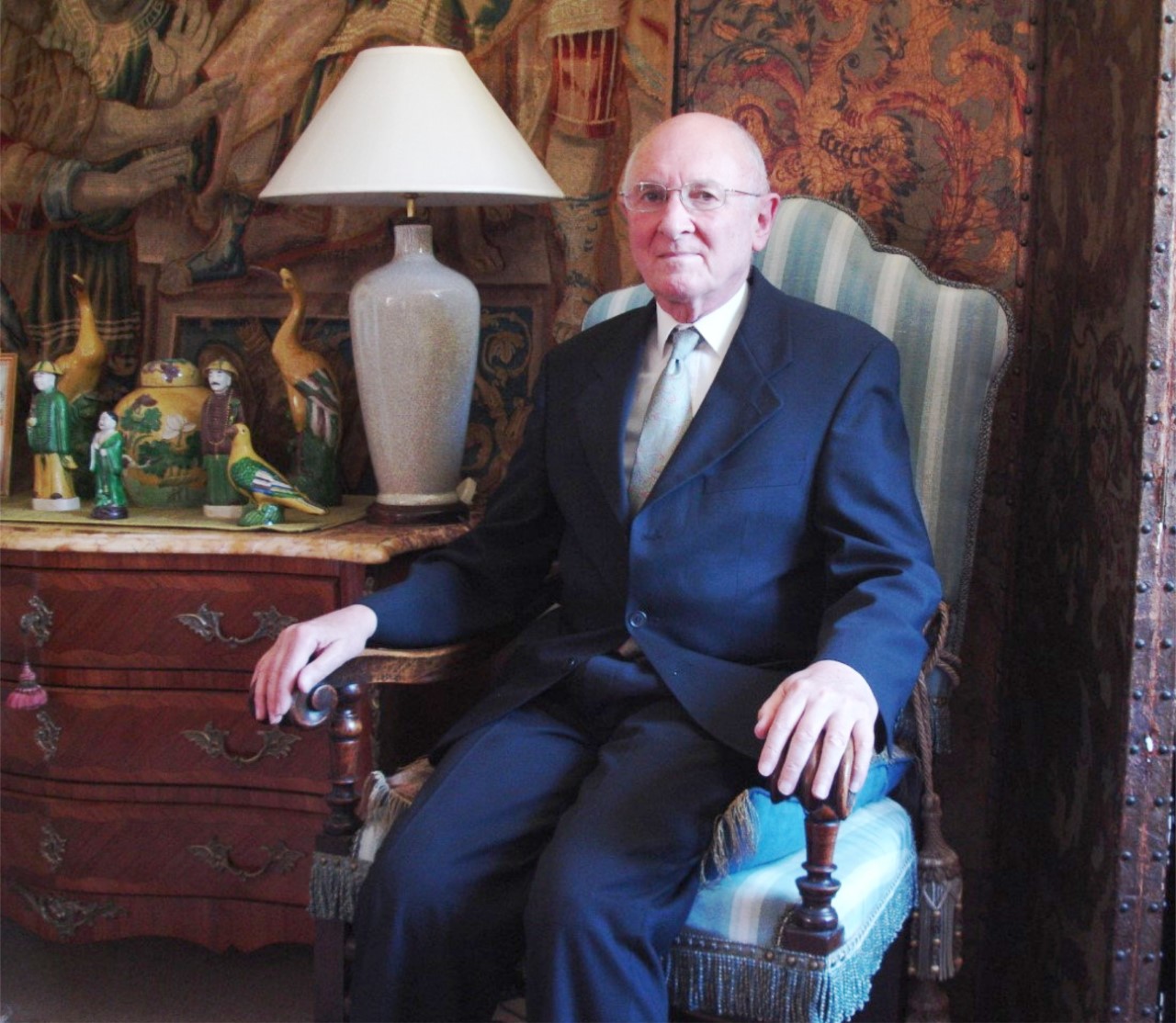
Professor Brian Fyffe Robinson sadly passed away on 5 December 2020 at the London Hospital at the age of 91 following a long illness. Professor Brian Robinson was born in Carshalton, Surrey, and educated at Sutton Grammar School during the Second World War. He studied medicine, anatomy and physiology at King's College in The Strand with clinical studies at St George's at St George’s, University of London, from 1958-1951.
After graduating, Brian joined St George's Hospital as a House Officer, later becoming a Senior Lecturer and a Reader. He then became the first Professor of Cardiovascular Medicine within the same institution, firstly at Hyde Park Corner and later at Tooting.
From 1962 – 1993, Professor Robinson collaborated with others on several papers concerning human pharmacological studies of peripheral veins and arteries with colleagues. During a two-year period of research at the National Institutes of Health (NIH) in Bethesda, Washington (from 1965 - 67), he published with Professor Eugene Braunwald and Steve E. Epstein. Professor Eugene Braunwald was the first to define the pathophysiology of hypertrophic cardiomyopathy and Steve E. Epstein was Chief of the Cardiology Branch of the National Heart, Lung, and Blood Institute at the National Institute of Health in Bethesda. Later, after returning to London, he published papers with Professor Tony Dornhorst, John Vane, Joe Collier and Patrick Vallance, amongst others, over a thirty year period. Brian had worked alongside other researchers who received the Nobel Prize, including Sir James Black and Sir John Robert Vane.
After leaving London, during retirement, Professor Robinson lived near Taunton, for 25 years. In 2014, whilst retired, Brian received a request to join a Committee within the Home Office advising the Prison Service. During this time, he worked upon methods to alleviate the risk of HIV infection amongst prison inmates and collaborated in training programs for Prison Staff.
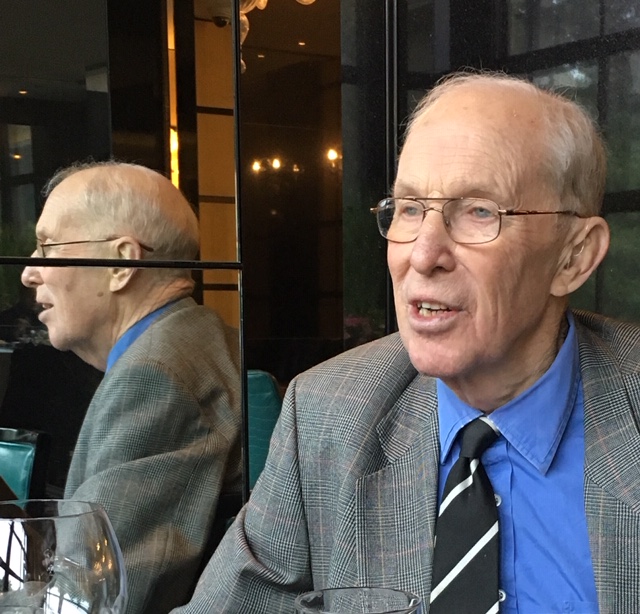
We are sad to share the news that Kenneth Saunders, Emeritus Professor of Physiological Medicine, has died. Professor Saunders was a Professor of Medicine at St George's from 1980-1996.
Professor Saunders is remembered by many former students as an outstanding teacher and clinician. He had a rich career in medicine, taking on several positions of responsibility throughout his career. As well as his role at St George’s, he took on junior and research posts at St Thomas' Hospital, Hammersmith Hospital and in the Cardiovascular Research Unit at the University of California, San Francisco.
Professor Saunders is fondly remembered by his colleagues. Former colleague, Mark Noble, worked alongside him as a research fellow at Comroe’s Cardiovascular Research Institute (CVRI) in the University of California, San Fransisco from 1966-1968. Mark Noble and Professor Rogers later set up a collaboration with the late John Widdicombe’s Physiology department.
Mark says: “The recent death of Professor Ken Saunders is very sad and evokes memories of good past times.
"Ken was a great example of what a Professor of Medicine should be, being widely educated, fluent in Latin and general knowledge.
"His knowledge of Medicine was vast, with no super-speciality prejudices. However, he was tolerant of people with reasonable new ideas. Ken was for us, the archetypical, knowledgeable, gentleman doctor."
Former St George’s colleague, Professor Peter Mortimer, says: “Ken was helpful and encouraging. He offered support where he could, but was never interfering.
"Looking back, I could not have expected anything more from him and my subsequent success with obtaining grants and establishing a laboratory was in no small part due to him. I will be forever grateful to him for that opportunity.”
Professor Saunders spent almost a decade at Middlesex Hospital Medical School - first as a senior lecturer in Medicine, before becoming postgraduate sub-dean and later becoming a reader in Medicine there.
From 1990-94, Professor Saunders was Dean of the Faculty of Medicine at the University of London and became an emeritus Professor of Medicine at the University of London in 1996.
Professor Saunders was a member of several societies and committees, including the General Medical Council and a special Advisory Committee on General Internal Medicine, and was also an honorary consultant physician to the Army for two years. He also co-founded the European Respiratory Society.
He wrote a number of papers on respiratory medicine and science in Clinical Science, and was a Censor and international examiner of the Royal College of Physicians. He had a lifelong fascination with the Classics, adding the study of Eqyptian to Latin and Greek, and contributing to the understanding of medicine in Homer that is accepted as definitive by scholars - occupations that he joked could be done sitting down. His health had deteriorated and he died at home on April 5th of a longstanding motor neurone condition.
Professor Saunders leaves behind his wife, Philippa, and his son and daughter Kate and Stephen. They will arrange a burial of his ashes in Cornwall, and - when possible - a celebration of his life in London.
If you would like to share your memories of Professor Saunders or messages of condolences, please email alumni@sgul.ac.uk.
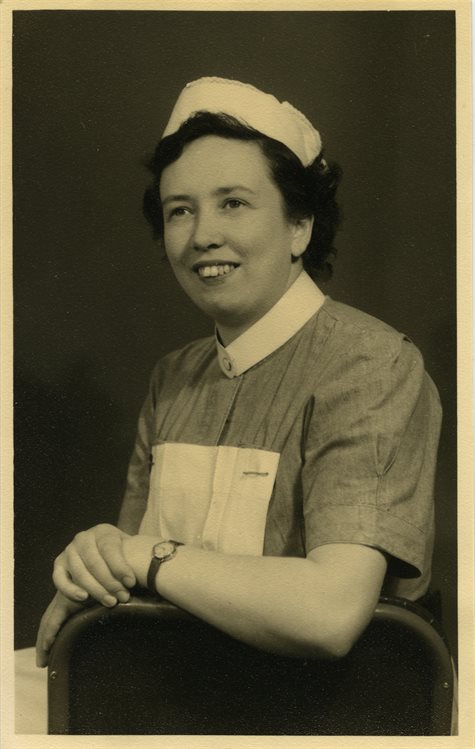
Margaret Elizabeth Gardner was born in Chard, Somerset on 22 June 1926. After gaining her school certificate at Ilminster Girls’ Grammar School she trained in nursery nursing. She trained at the National Childrens’ Home, first at Holmwood Bristol, a home for nursery school children, and then at Harpenden caring for babies. She obtained her nursery nurses’ diploma before working at Oxted, then Woking, over a period of three years.
In 1949, Margaret started her general nurse training at St George’s at our former campus in Hyde Park Corner. After completing her training, she continued to work at St George’s as a ward sister for several years before completing a nurse tutor course at Queen Elizabeth College, Holland Park. Margaret then returned to St George’s as a Nurse Tutor, where she stayed for another three years, before responding to a need for a nurse tutor at Wesley Guild Hospital (Ilesha) Nigeria. Margaret stayed at the hospital for 11 years between 1961 and 1972.
On returning to Britain, she worked as a nurse tutor at University College Cardiff before becoming Director of Nurse Education at Southmead Hospital in Bristol until she retired. During this time she lived in Westbury on Trym in Bristol. She lived in her own home before moving to St Monica Trust Retirement Village until she died on 30th April 2020. Margaret always had a strong Christian belief and devoted much time to supporting the work of the Methodist Church and to the service of others. Margaret’s cousin, Peter Warne, says:
“She was an intelligent, humorous and generous woman, who used her gifts to support young people as they started their nursing careers.”
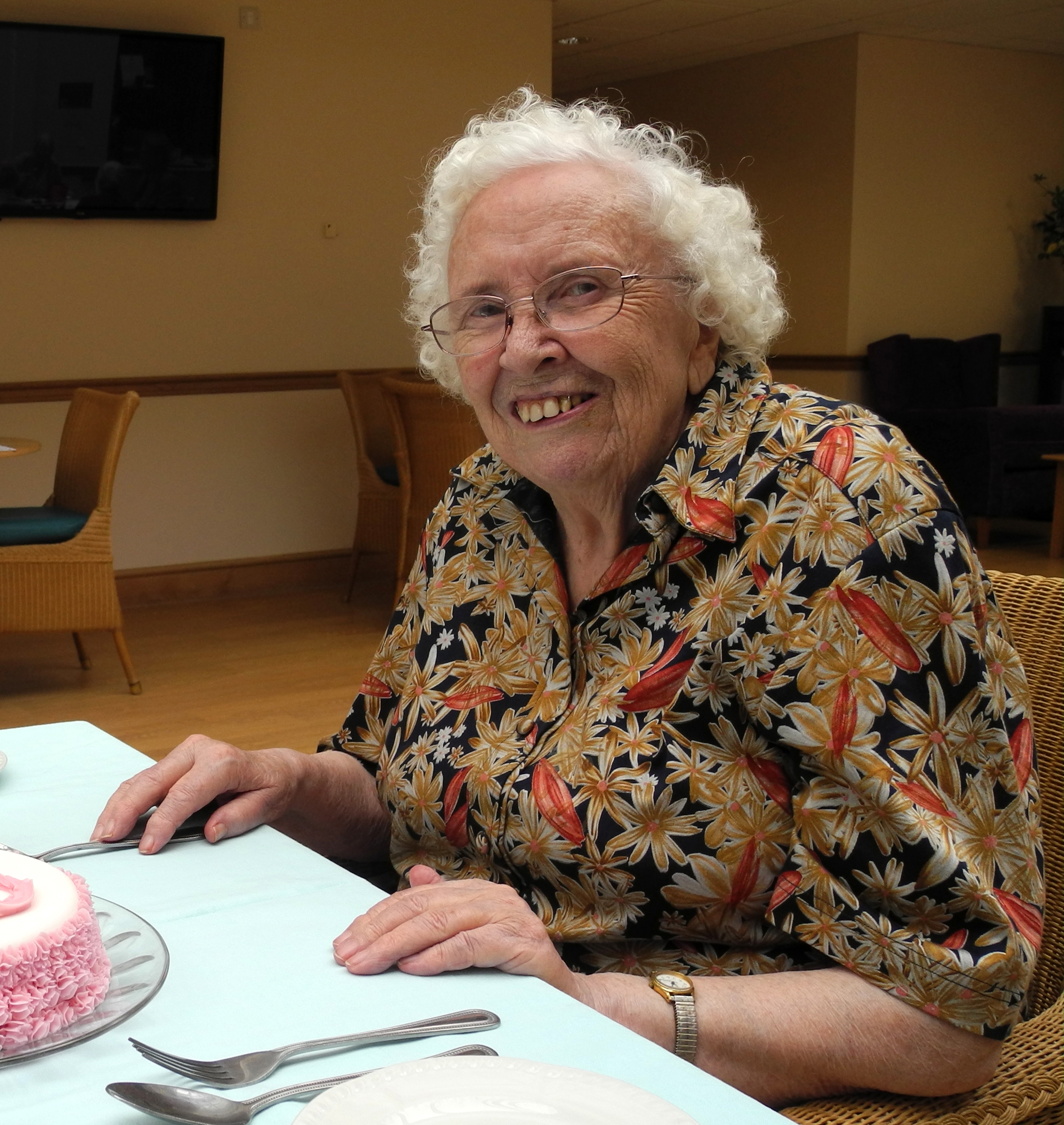
Emeritus Professor of Endocrinology Saffron Whitehead sadly passed away on 18 February 2019. She will be remembered for raising the profile of endocrinology and women’s health through her research, writing, media and public engagement activities. She will be greatly missed by staff and students alike.
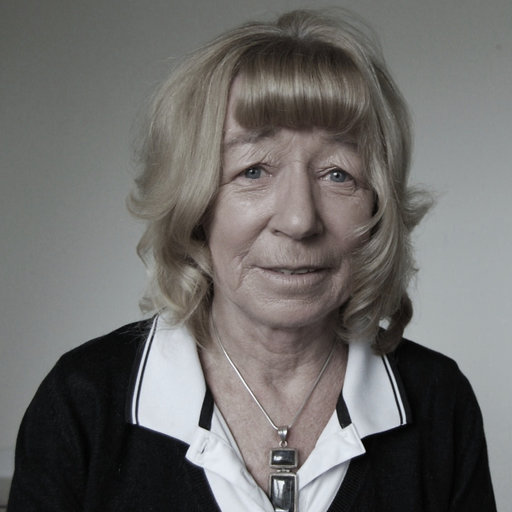
Professor Whitehead was an eminent scientist with a passion for endocrinology and a real champion for women’s health. She was prolific author, and in fact her latest book Managing Obesity: a practical guide for clinicians was published alongside co-author Dr Gul Bano earlier this year. Across her academic career, she published 55 notable papers, five reviews and three endocrinology text books, which became definitive texts on many university degree courses. Saffron was a thoughtful and supportive colleague and supervisor, who gave willingly of her vast font of knowledge and wisdom.
Saffron gained her PhD in 1974 from McMaster University in Canada, where she specialised in Medical Sciences (Neuroendocrinology). Prior to that, she graduated from University College London in 1967-1970 with a BSc Physiology (Hons). Long before it became mainstream, she was researching the interactions of endocrine disrupting chemicals (EDC) and hormones and how they impact on fertility and cancer. Saffron joined St George’s University of London in 1978 as lecturer in both endocrinology and reproduction. She was responsible, alongside Professor Helen Mason, for creating the third year Science of Reproduction module for the BSc/iBSc in Biomedical Science, and will be remembered fondly by her students across the years.
To help advance the public discussion around better understanding of science, she published articles in the media in publications such as New Scientist and The Guardian, under her married name, ‘Saffron Davies’. She was a constant advocate of women in science, having herself combined raising a family with maintaining a scientific career. She also contributed regularly to TV and radio shows, including appearances on BBC4’s ‘The Fantastical World of Hormones’ with John Wass and Radio 4’s ‘Women’s Hour’. She was the scientific advisor on ‘Tide Tables’ a 2011 play supported by the Wellcome Trust and the Society for Endocrinology (SfE). The play centred on the challenges of midlife as a time of significant biological change.
Saffron contributed to her scientific field beyond her teaching and research responsibilities with active roles in both the Physiology Society and the SfE. She was a member of the Physiology Society from 1980, edited the Physiology News (1994-98) and served on Council (1995-99). Likewise, Saffron served on the editorial board for The Endocrinologist for many years and was the editor from 2004-2005. She was the Chair of the Public Engagement committee for the SfE, also managing Press enquiries on publications and scientific breakthroughs for the Society.
Saffron was hard-working but always full of fun, and this was evident in the fact that despite retiring several years ago, she was still actively teaching and was a personal tutor at St George’s. Outside of her work, Saffron was also a governor for Oak Lodge School for the deaf. In addition she volunteered with the Shaw Trust, a charity helping people gain an education, enter work, develop their career, improve their wellbeing or rebuild their lives. Saffron was an active tennis player and loved to play the piano.
Saffron is survived by her husband Dr John Davies, three sons, daughters-in-law and four grandchildren.
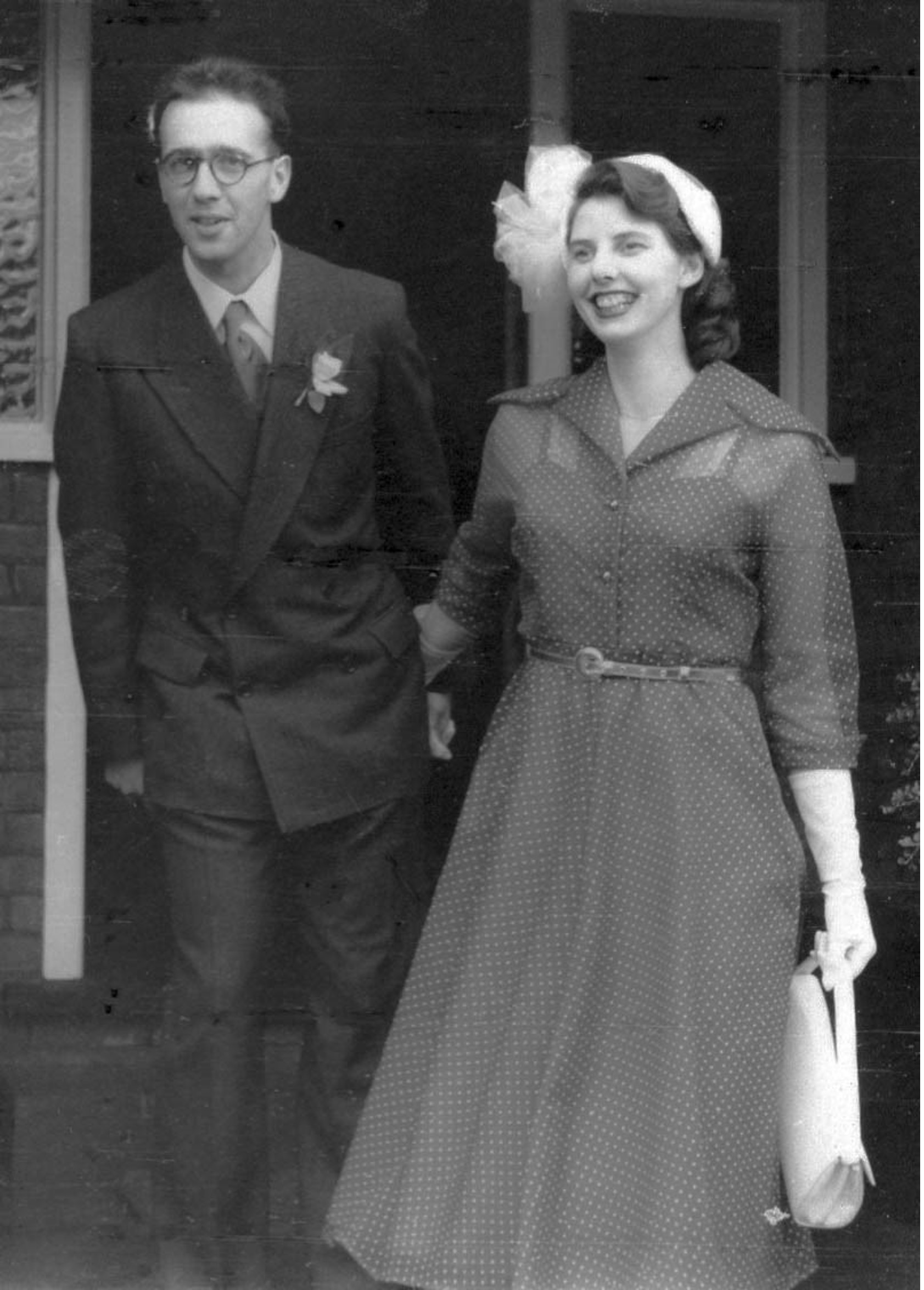 Dr Peter Wale grew up in Welwyn Garden City and completed his pre-clinical studies at St George’s before graduating from Kings College London in 1955.
Dr Peter Wale grew up in Welwyn Garden City and completed his pre-clinical studies at St George’s before graduating from Kings College London in 1955.
During National Service, he trained as a Radiographer and was then posted to East Africa, where he led the Radiography unit at the Royal Military Hospital, Nairobi. However, on his outward he caught Dengue fever.
In Nairobi he contracted bacillary dysentery, resulting in embolisms. He was treated with the first anticoagulant, Dicumarol, before being repatriated and medically discharged in 1949.
Peter was a House Surgeon and House Physician at Farnborough Hospital, Kent, before a House Physician post at Hammersmith Hospital’s Radiotherapy department set him on his career path. He later worked in Registrar posts at Charing Cross and Guy’s Hospital.
After being appointed Consultant at Oldchurch Hospital, Romford, he became a member of the Faculty of Radiologists in Clinical Radiotherapy (FFR). His final appointment, before retiring in 1990, was at the Derby Royal Hospital, where he modernised and built up the department and the hospice.
Retirement gave Peter the opportunity to focus on his life-long passion for monochrome photography, as well as travelling to Africa, Australia and America. He also enjoyed walking in the Peak District with friends.
Peter was widowed in 2007 and is sadly missed by his four sons and three granddaughters.
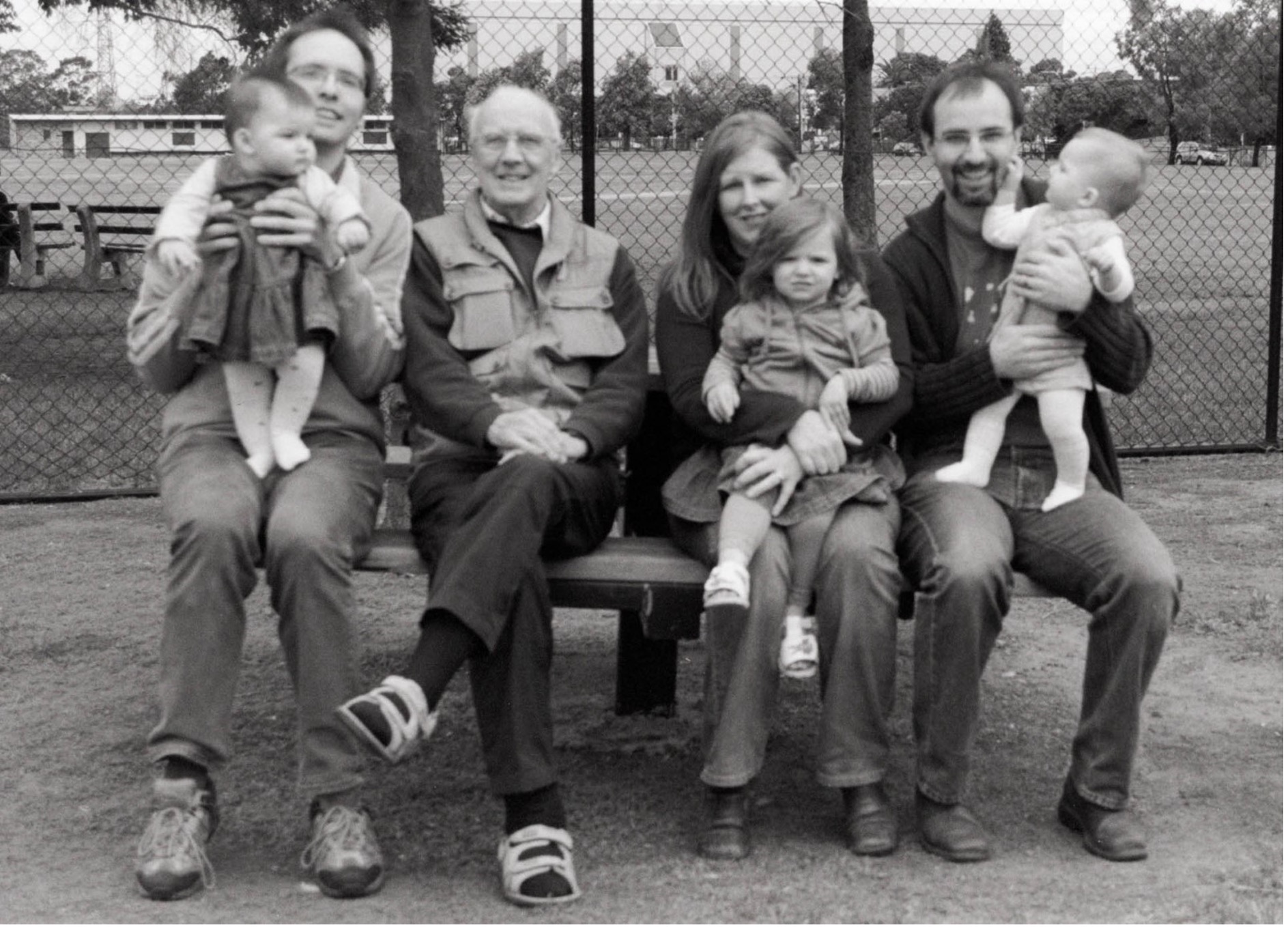
We are sorry to announce the sudden death of Neil Manley following a road traffic accident on Sunday 30 June.
Neil had completed a BA in Contemporary Media Practices at the University of Westminster before changing track and moving into Physiotherapy. After graduating from St George’s in 2013, Neil worked in various physiotherapy jobs in and out of London, including at Guy's and St Thomas' NHS Foundation Trust and the Southwark Enablement Team.
Neil was well-loved by his classmates, colleagues and patients for his warm and caring nature, and following his death his family has received many letters from those he treated, paying testament to his patience and compassion. Lecturers at St George’s have commented on his commitment and dedication to his studies and have shared fond memories of visiting him on placement, where he was popular with the patients in his care.
Should friends and classmates wish to show their support, Neil’s family asks that instead of sending flowers a donation be made to the London Air Ambulance service and St George's Neuro ICU, where Neil was treated. Neil will be sorely missed by those who knew him, but his family finds comfort in the care he received at the end of his life at St George's, a place he loved so much.
Dr Norton Lynn Short MBE, who died in November 2018, attended St George’s from 1952-1958.
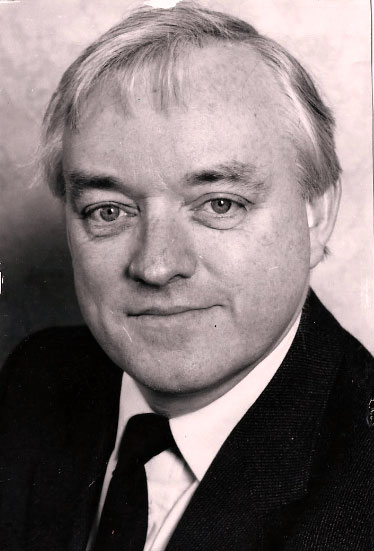
Norton was awarded his MBE for services to medicine in 1998, and became a fellow of the Royal College of General Practitioners in 2000, having dedicated his life to the advancement of medical science.
Having completed his degree at St George's, Norton went on to pursue a career spanning forty years as a GP in Kent. He published a range of articles on clinical and medico-legal subjects and also medical ethics.
Keen to share his knowledge with the next generation, Norton taught as part of the faculty of the Royal College of General Practitioners between 2003-2010, where he was also an accreditation visitor from 1990 - 2006.
Norton took an interest in the management and wider success of the NHS, having held a position as a Healthy Authority member for Dartford and Gravesham NHS Trust from 1985 to 1993. In addition, he was a Board Member of the Queens Nursing Institute from 1985-1993.
At home, his interests extended well beyond science, with travel, history and opera among his passions, even resulting in an MA degree. While completing his studies at St George's, Norton was also a member of the undergraduate Rugby team.
Norton held an impressive list of qualifications, including an MBBS ( Bachelor of Medicine, Bachelor of Surgery ) DRCOG (Diploma from the Royal College of Obstetricians and Gynaecologists) and MRCGP (Member of the Royal College of General Practitioners).
Norton leaves behind his wife Chrys Short and five children from two marriages. Both Norton's wife Chrys and his former wife Barbara, who also studied at St George's, were nurses. Four of his children now work in medicine and healthcare, with two daughters who went on to become nurses and two sons who followed in his footsteps to become doctors.
Our condolences go to his family and friends.
Professor Denis Mitchison, who has died aged 98, will be remembered for his outstanding contribution to the field of tuberculosis research. ‘Denny' as he was known, was Emeritus Professor in the Institute for Infection and Immunity at St George's, and only formally retired from academic life in 2015.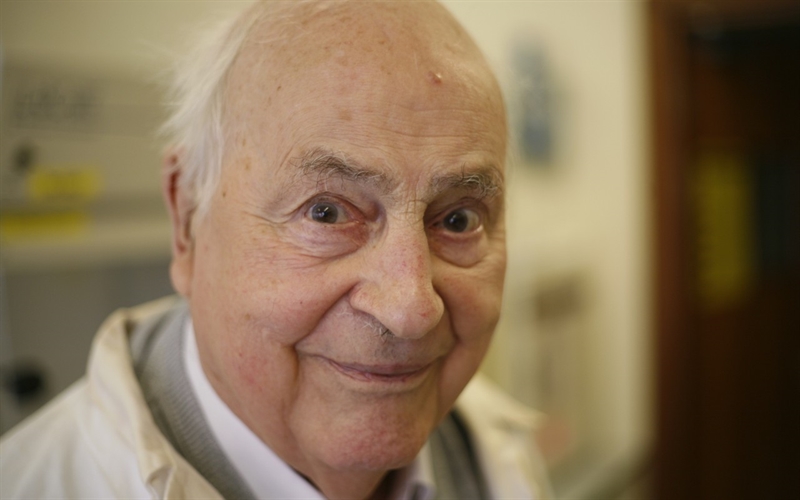
As a pathologist in the 1940s, at the Brompton Hospital in London, Denis Mitchison carried out the first randomized controlled clinical trial which involved tuberculosis. He and his colleagues investigated the antibiotic streptomycin, comparing its efficacy with the then standard treatment, bed rest. He pioneered drug combinations to address antibiotic resistance which was already on the rise.
Later, as Director of the Medical Research Council Unit for Research on Drug Sensitivity in Tuberculosis, he turned his attention to the problem of TB in the developing world. He devised a pioneering set of trials in India that compared inpatient and outpatient treatment of TB. These showed that home care was just as effective as being held in a sanatorium for months and led to a new WHO plan to get treatment out to those who needed it.
His research on drug combinations led to the reduction of treatment periods, and he was at the forefront of developing so called ‘short-course' regimes. These short course regimens remain the basis of today's current standard TB therapy.
His enormous body of work was recorded in more than 250 publications and recognised with prestigious awards.
Even after his first ‘retirement' in 1985 he continued to innovate in the field, developing new techniques to measure early bactericidal activity of drugs and establishing new approaches to accelerate phase II clinical studies for TB drugs.
We extend our warmest sympathies to his family.
Sheila Evelyn Bradford (nee Haigh), who completed her Nursing training at St George’s, died in December 2018. She was an enthusiastic member of the St George’s Nurse's League and attended their 25th and 50th year reunions.
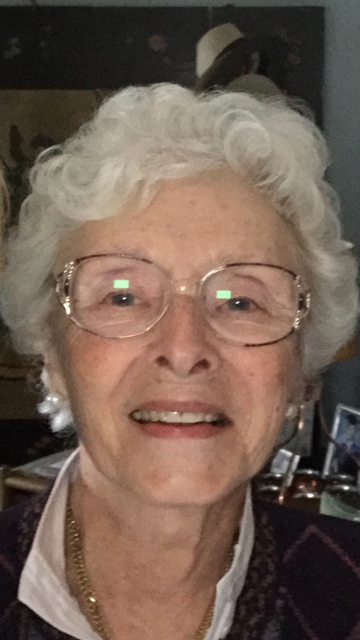
Sheila was born in London in 1938 and suffered from scoliosis throughout her life but did not let this prevent her from having an active lifestyle. In her free time, she enjoyed playing squash and dancing, and took part in competitive sailing.
After completing her training at St George’s, she decided to complete an army short-service commission. Once accepted, she took and passed her Part 1 midwifery exam, and proceeded to the Queen Alexandra's Royal Army Nursing Corps (QARANC) Depot and Training Centre (QATC). She was then posted to London Queen Alexandra's Military Hospital at Millbank, which later became Queen Elizabeth Military Hospital. There, she helped treat those in the services who were repatriated from worldwide units and military hospitals for specialist care.
Sheila met her husband David, a doctor in the army, when working at the same hospital, and they were engaged and married within the year – on his birthday on 12th December 1962. Shortly after becoming engaged she was posted to her first and only overseas post - to the British Military Hospital in Hanover, Germany. She stayed there for a few months before returning to the UK to get married.
Sheila was fascinated by different cultures and she and her husband enjoyed travelling. She spent some of her time abroad teaching English to Chinese friends in Hong Kong, and later learnt German while back in Hannover many years after her solo posting. They would later spend much of their time in Christchurch, New Zealand, where their daughter Tafflyn lives.
Sheila leaves behind her two daughters Tafflyn and Melissa, eight grandchildren and a great grandson. Our condolences and best wishes to her family.

Nigel was brought up in Guernsey and Dorset and did his pre-clinical training at University College London. We were allocated rooms in a shared house in Norbury and moved together to another house in Balham and then a flat in Tooting High Street.
Nigel had several enduring interests---motorbikes, hockey and historic architecture---apart from medicine.
He was proud owner of a T120 Triumph Bonneville which was sadly stolen from outside the Tooting flat.
Nigel was captain of the SGHMS hockey team.
I remember him enthusiastically clambering over the site of a Turkish amphitheatre and pointing out interesting features of old churches.
Nigel initially aimed at a career in Surgery, but had difficulty with the exams and eventually settled down to a career as a GP in Sussex.
He eventually married an Art Dealer and they made their home in a listed manor house in a delightful Oxfordshire village, where he delighted in looking after the grounds and garden. He still owned a large motorbike.
He developed cardiac arrhythmias and despite expert assessment died suddenly at home.
Nigel was my best man and I returned the favour.
Obituary written by friend and classmate Keith Mundy.
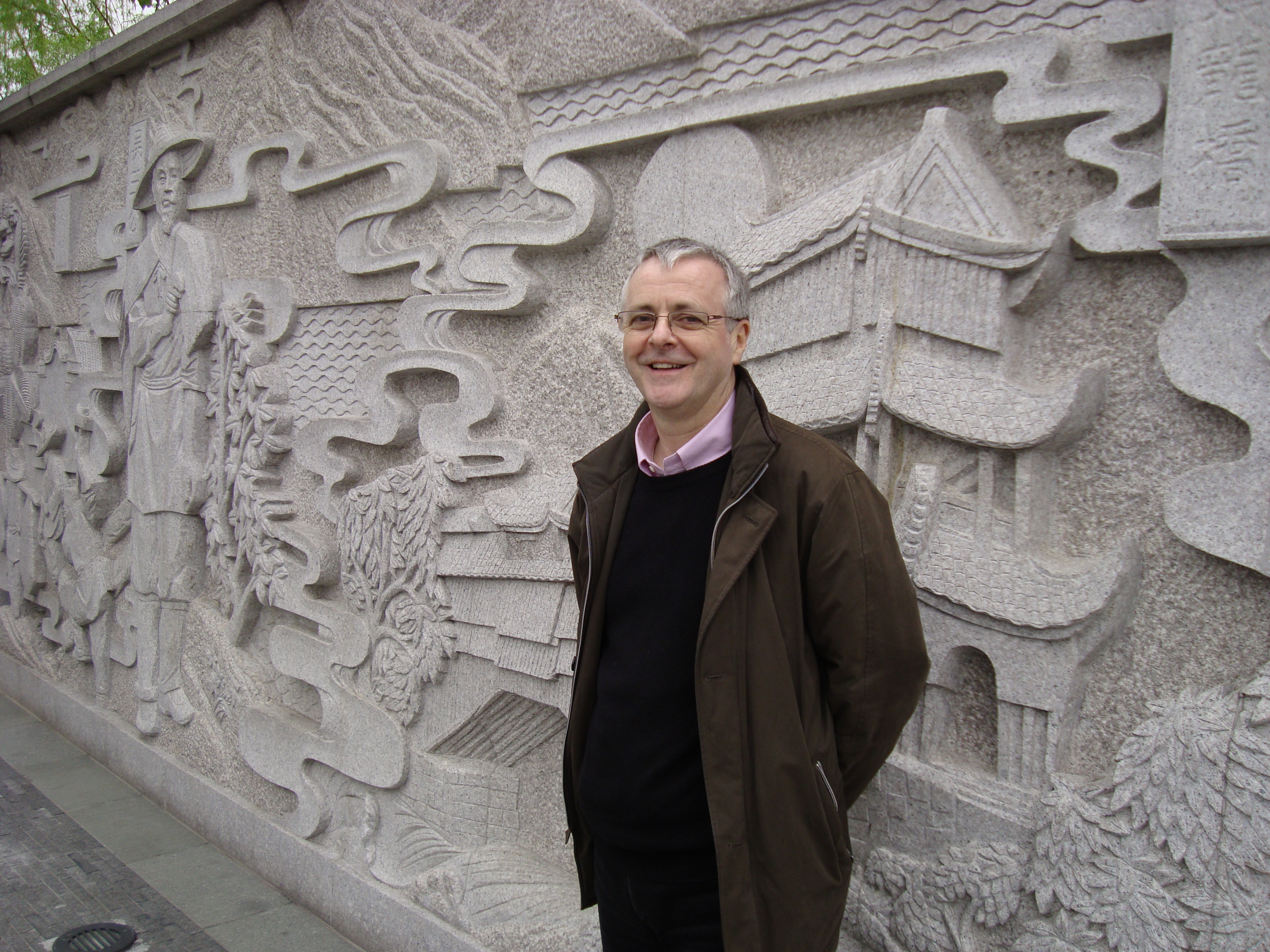
Grant attended St George’s from 1972-1977. He was a GP in the Lillie Road practice in Fulham from 1980-2010, and became senior partner in 2005. He was also senior teaching fellow and final year GP course coordinator for Primary Care at Imperial College. For many years he was the joint head of the year 6 student assistantship on the undergraduate medicine course. He became an advisor for the PCT on primary care in HMP Wormwood Scrubs and worked on a system redesign for the Prison Health Service.
In 2006 he took a four-week sabbatical in China, organised through the RCGP, to advance Primary Health Care in China. This was the start of a great working relationship with the health service in Zhejiang province, centred in Hangzhou (a major city about three hours from Shanghai). He devised with colleagues a curriculum to enhance the consultation and communication skills community physicians locally. He visited universities, teaching students and modelling the kind of consultation he would do at home.
For all his long years as a stalwart teacher of Primary Care at Imperial and its delivery at Lillie Rd Practice in Fulham, it was his contribution to the development of the Chinese Health Service of which he was really proud. In the last month of his life a delegation from Hangzhou came to see him and present a special letter of appreciation. This described him as the ‘one who has dug the well for primary care in Zhejiang’. He was delighted with it, and with being made an honorary consultant in community health care in Zhejiang. Grant was a devoted family man, and is survived by his wife Alison and two daughters Eve and Lottie.
Obituary written by friend and classmate George Turner.
We are sad to record the death of Dr Edward M “Ed” Dunbar, who graduated from St George's in 1972. 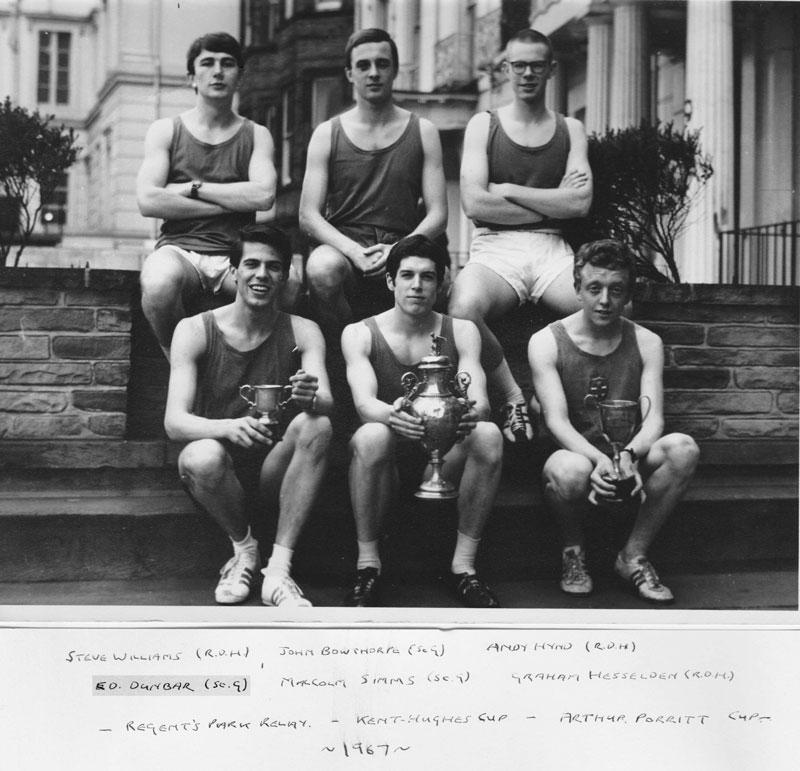
Edward died suddenly at home on 6 December. He was an irrepressible character and a highly respected consultant in infectious diseases in Manchester and the North West.
Edward had a special interest in, and commitment to, management of HIV infection, also travelling to Africa to support communities there. He was a brilliant runner in his youth, being part of the team that brought the Hospitals Cup running championship to St. George's for the first time in our history in 1967. His devotion to causes was passionate – exemplified not only by his approach to high quality clinical care but also his support for the Wales rugby team.
Edward's wife is alumna Professor Jacky Hayden, who graduated in 1974 and worked as a GP before being appointed as Dean of Postgraduate Medical Studies for the North Western Deanery NHS North and Manchester. There, she established systematic processes to ensure that doctors and dentists completing training to provide the highest possible patient care. Jacky has also contributed to several other boards and committees such as Medical Education England and the Royal College of General Practitioners.
Our condolences and best wishes to Jacky and their two sons.